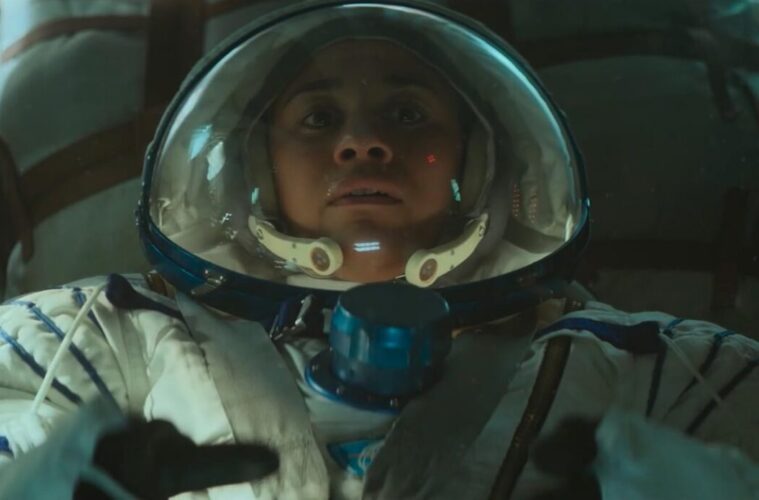 I.S.S. Delivers the Goods in Tense but Slender Space Thriller
I.S.S. Delivers the Goods in Tense but Slender Space Thriller
The new sci-fi thriller I.S.S. posits a terrific concept: What if six astronauts, three Russians and three Americans, work together on the International Space Station (I.S.S.) when nuclear war breaks out on Earth? The Cold War is back but this time it’ll play out in the cosmos instead of a couple “war rooms.” And this time they won’t merely threaten each other from the shadows but will come to blows. Working from Nick Shafir’s Blacklist script, the story could be straight out of a 1950’s paperback while also tapping into recent geopolitical anxieties. It’s a thrilling concept with the potential to be something quite memorable. Although director Gabriela Cowperthwaite confidently crafts an eerie potboiler with a noble message, the movie never fully explores the interesting ideas that are hardwired in the script. As a genre film, it’s worth your time and a fun ride, but the result also feels half-baked and slight. With such a promising premise, it’s difficult not to hope for something a little more sublime. The tension is there, sure, but why play a game of checkers when you have a beautiful chessboard?
Dr. Kira Foster (Ariana DeBose, West Side Story) boards the I.S.S. eager to meet the crew and start researching a cure for an unnamed disease. Actually, all the crew members work in biochemistry and conduct experiments that require zero gravity. Foster’s American compatriots include Gordon Barrett (Chris Messina), a veteran with the air of a stoner floating in his living room, and Christian Campbell (John Gallagher Jr.), a cagey huckster who’s either looking over his shoulder or whining about missing his daughters (he’s the classic codependent American). On the Russian side, there’s Weronika (Masha Mashkova), engaged in a clandestine affair with Messina’s Barrett, a beefy and stoic Alexey (Pilou Asbaek, Game of Thrones), and their steely but seemingly empathetic supervisor, Nichola Pulov (Costa Ronin, The Americans). All the actors are in peak form here, injecting their characters with a gravitas and believability the movie struggles to equal.
Initially, Foster is impressed with the crew’s obvious camaraderie. At the end of the day, everyone meets for dinner, passing the Vodka bottle around while navigating their language barrier. Even if she detects a little tension underneath the surface, especially when Barrett slags off The Scorpions’ “Wind of Change,” which Alexey defends by saying it has a special relevance for the Russian people, they still seem to love each other. The next day, they’re back to work, hovering over their stations, when Barrett looks out the window and sees that Earth has erupted in patches of fiery explosions, which can only mean one thing: Nuclear War. Afterward, each side receives a message from their governments to take the ship by any means necessary, and just like that, the good times are over, and the fighting begins.
Unlike the ship in Alien whose corridors stretch for miles, the I.S.S. is a realistic rendition of a NASA vessel. Constricted in size and volume, the interior is made up of a couple of chutes that bind it together with small enclaves where the crew sleeps. Cowperthwaite negotiates this oppressive terrain with a fluid inconspicuousness as her camera follows each character drifting through the passages like ghosts. At times, it’s confusing to know where we’re located, but it’s of no great consequence since the movie’s mood overwhelms its context. Shafir’s script also builds a concentrated paranoia where we don’t know who to trust at any given moment, which is easily the most interesting part of the film and should’ve been mined for more gold. Instead, the screenplay grows restless and devolves into an anemic version of Red Dawn or Rocky IV. The movie’s restless bloodthirst is also odd since it contradicts its underlying message regarding our willingness to quickly polarize the other side. After watching I.S.S., which is genuinely effective but flawed, you realize the genius of a director like Tony Scott, who was able to sustain the story’s white-knuckled suspense while holding off its inevitable explosion in movies like Crimson Tide. This one just goes for it, quickly, which is a bit of a letdown.
It looks great, thanks to cinematographer Nick Remy Matthews, and the performances are tense, realistic and gritty. There were times when the theater went silent, waiting in anticipation for the next scene. However, there are some artistic choices, which keep it from being truly sublime. First, why not spend a little more time establishing these characters before having them clash like Vikings? As it stands, we simply don’t understand their motives. Okay, they follow orders, fine, but are they also robots? Also, the filmmakers seem to be selective in showing the subtitles on the screen. In particular, there are a couple scenes where the Russians speak in their native language and the subtitles have disappeared, or they pop up intermittently. Then, a couple scenes later, bam, there they are again without an issue. Is this a ploy to elicit our attention?
Still, there are some fantastic ideas bubbling underneath the surface of this little actioner. You won’t encounter any slimy space creatures lurking around corners to create the film’s claustrophobic ambiance. The only monster in this movie is the one squirming in our collective perception of the world: How far would we go to plant a flag of nationalism? How blind have we become to our shared humanity? Unfortunately, such lofty ideas require a little more subversion and complexity than simply throwing two sides into the ring to see who wins. No matter, the questions continue floating in the ether long after our heroes vaporize.
Advertising disclosure: We may receive compensation for some of the links in our stories. Thank you for supporting LA Weekly and our advertisers.

